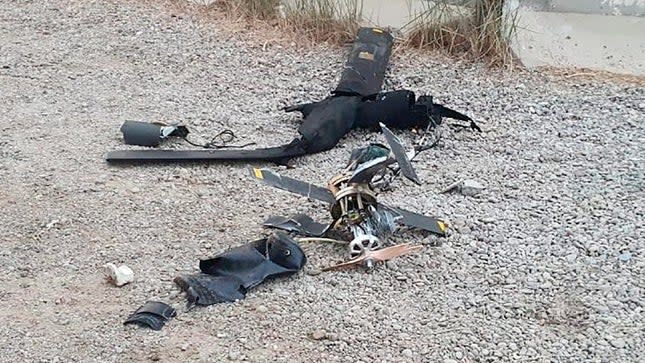Overnight Defense & National Security — Nuclear states say no winners in global war

It's Monday, welcome to Overnight Defense & National Security, your nightly guide to the latest developments at the Pentagon, on Capitol Hill and beyond. Subscribe here: thehill.com/newsletter-signup.
The U.S., Russia and three other nuclear states say there are no winners in nuclear war.
More on their thoughts, plus the drones that were shot down in Iraq on the two-year anniversary of the assassination of Iran's top general, and Defense Secretary Lloyd Austin's breakthrough COVID-19 case.
For The Hill, I'm Jordan Williams. Write me with tips at jwilliams@thehill.com.
Let's get to it.
Big 5 nuclear weapon states weigh in

The U.S. and Russia stress that there's no winners in nuclear war amid increasing tensions, in a joint statement released on Monday with China, France and the United Kingdom.
The nations said they consider the "avoidance of war between Nuclear-Weapon States and the reduction of strategic risks as our foremost responsibilities."
"We affirm that a nuclear war cannot be won and must never be fought," the statement said. "As nuclear use would have far-reaching consequences, we also affirm that nuclear weapons - for as long as they continue to exist - should serve defensive purposes, deter aggression, and prevent war."
"We believe strongly that the further spread of such weapons must be prevented," it continued.
Washington's tensions with Russia, China: The statement from the so-called "P5 countries" - the five permanent members of the United Nations Security Council - comes amid mounting tensions between Russia and Western nations over Moscow's buildup of troops near the Ukrainian border.
American and Russian officials are slated to meet on Jan. 10 to discuss each other's security concerns, after which will be a meeting of the NATO-Russia Council and meeting of the Organization for Security and Co-operation in Europe's Permanent Council.
The statement also comes as China increases its nuclear weapons capability. A report from the Department of Defense released in November predicted that Beijing intends to have 1,000 nuclear warheads by 2030, which greatly outpaced the Pentagon's past estimates.
Drones shot down in Iraq

Two armed drones approaching U.S. troops in Iraq were shot down on Monday, Reuters reported.
The drones were approaching a military base housing U.S. troops, the outlet reported, citing U.S. and Iraqi security officials.
An official of the U.S.-led international military coalition told the outlet that the base's defense system engaged "two fixed-wing suicide drones. They were shot down without incident."
"This was a dangerous attack on a civilian airport," the official told the outlet.
SOLEIMANI ANNIVERSARY
Monday marks the second anniversary of the assassination of Iran's top general, Maj. Gen. Qassem Soleimani.
Soleimani was killed in a U.S. airstrike in Baghdad that struck his convoy and was ordered by then-President Trump.
No one immediately claimed responsibility for Monday's incident involving the drones shot down in Iraq. But footage of the drones provided to the outlet by the international coalition showed debris with writing that said "Soleimani's revenge."
Iran wants Trump to face trial: On the two-year anniversary of Soleimani's assassination, Iranian President Ebrahim Raisi gave a speech calling for Trump and former Secretary Mike Pompeo to face trial for the airstrike.
Raisi said Trump and Pompeo should be "tried in a fair court" for the assassination of Soleimani. He called Trump an "aggressor," "murderer" and the "main culprit."
More on the anniversary of Soleimani's assassination:
Iran calls for Trump, Pompeo to face trial for Soleimani assassination
Thousands rally in Baghdad on anniversary of Soleimani death
Pro-Iranian hackers target Israeli newspaper on Soleimani assassination anniversary
Austin's breakthrough COVID-19 case

Defense Secretary Lloyd Austin announced Sunday evening that he tested positive for COVID-19.
"I tested positive this morning for COVID-19. I requested the test today after exhibiting symptoms while at home on leave," Austin said in a statement.
He added that he was experiencing mild symptoms and planned to quarantine at home for five days.
"Stemming the spread of this virus, safeguarding our workforce and ensuring my own speedy and safe recovery remain my priorities," his statement added. "To the degree possible, I plan to attend virtually this coming week those key meetings and discussions required to inform my situational awareness and decision making."
Brand new guidance: Austin's infection comes shortly after the Centers for Disease Control and Prevention (CDC) changed its guidance to shorten the length of quarantine from 10 days to five days for people who test positive for COVID-19 but are asymptomatic or have symptoms that are resolving. That isolation period should be followed by five days of masking around others, the agency said.
Earlier on Sunday, Anthony Fauci, the White House chief medical adviser, said that the CDC was considering further amending its isolation guidance for asymptomatic COVID-19 cases with a possible testing requirement.
"There has been some concern about why we don't ask people at that five-day period to get tested. That is something that is now under consideration," Fauci said during an appearance on ABC's "This Week."
NEW RULES AT THE PENTAGON
Last week, the Pentagon announced new mitigation efforts amid an increase in new cases in the National Capitol Region-which is the area including and surrounding Washington, D.C.
Among the new measures, food concessions at the Pentagon will not have seats available for diners beginning Jan. 3, and unofficial visitors will not be allowed in the building through the end of January.
Read more on Austin's diagnosis here.
WHAT WE'RE READING
Biden warns Putin of 'severe sanctions' if Russia invades Ukraine
Taiwan president warns China over 'military adventurism'
Democrats return with lengthy to-do list
Capitol Police chief says force plans 'more well thought out' after Jan. 6
Well, That's it for today! Check out The Hill's defense and national security pages for latest coverage. We'll see you tomorrow.

